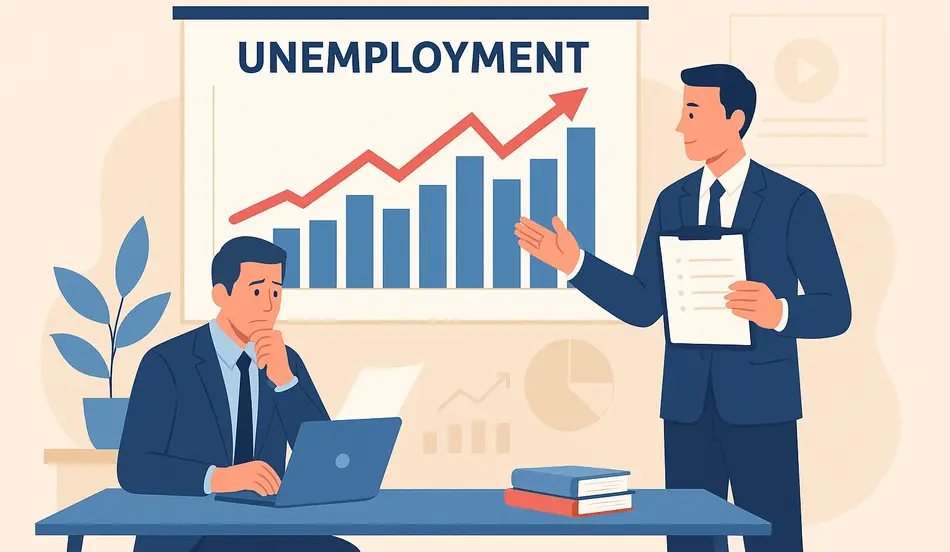Unemployment isn’t just a statistic that affects job seekers—it has profound implications for employers that can shape hiring strategies, financial planning, and overall business operations. Understanding how unemployment impacts employers is crucial for making informed decisions about recruitment, retention, and financial management.
Whether you’re a small business owner, HR professional, or corporate executive, the unemployment rate directly influences your ability to attract talent, manage costs, and maintain competitive advantage. This comprehensive guide breaks down the various ways unemployment affects employers and provides actionable strategies for navigating different market conditions.
The Hiring Challenge: Low Unemployment vs. High Unemployment
Low Unemployment: The Talent War
When unemployment rates are low, the job market becomes highly competitive, creating significant challenges for employers. With fewer people actively seeking employment, businesses must work harder to attract and retain top talent.
The Competitive Landscape:
- Salary pressure – Employers must offer higher wages to compete for candidates
- Enhanced benefits – Companies need to improve benefits packages to stand out
- Budget strain – Increased compensation costs can put pressure on profit margins
- Extended hiring timelines – Finding qualified candidates takes longer
In a tight labor market, employers often find themselves in bidding wars for top talent, driving up costs and making it difficult to maintain budget discipline. This competitive environment forces businesses to be more creative and strategic in their recruitment efforts.
High Unemployment: More Candidates, Less Spending
Conversely, when unemployment rates are high, employers face a different set of challenges. While there may be more candidates available, this doesn’t always translate to easier hiring.
The High Unemployment Paradox:
- Increased candidate pool – More people are looking for work
- Reduced consumer spending – Fewer people with stable incomes means less business
- Quality vs. quantity – More candidates doesn’t always mean better candidates
- Economic uncertainty – Businesses may be hesitant to hire during economic downturns
High unemployment can create a vicious cycle where businesses see reduced demand for their products or services, making them reluctant to hire even when qualified candidates are available.
How Does Unemployment Impact Employers?
Shifts in unemployment rates can reshape hiring dynamics, wage expectations, and talent availability. Smart employers act early to secure the best candidates before the market shifts again. Post your job on WhatJobs today and connect with qualified professionals — free for 30 days.
Post a Job Free for 30 Days →Financial Obligations: The Hidden Costs of Unemployment
Unemployment Tax Responsibilities
One of the most direct ways unemployment impacts employers is through unemployment insurance taxes. These financial obligations can significantly affect a company’s bottom line and require careful management.
Understanding Unemployment Taxes:
- Federal unemployment tax (FUTA) – 6% on the first $7,000 of each employee’s wages
- State unemployment tax (SUTA) – Varies by state and company’s experience rating
- Experience rating system – Companies with more unemployment claims pay higher rates
- Quarterly reporting – Employers must file regular reports with state agencies
The experience rating system means that companies with a history of layoffs or high turnover will pay higher unemployment tax rates, creating a financial incentive to maintain stable employment.
Managing Unemployment Claims
When former employees file for unemployment benefits, employers receive official notices and must respond appropriately to protect their interests and control future tax rates.
The Claims Process:
- Initial notice – Employers receive notification when a claim is filed
- Response deadline – Typically 10-14 days to respond
- Validation or contest – Employers must provide accurate information
- Appeals process – Both parties can appeal unfavorable decisions
- Impact on rates – Valid claims can increase future tax obligations
Properly managing unemployment claims is essential for controlling costs and maintaining accurate experience ratings. Employers should maintain detailed records of employee separations and reasons for termination.
Strategic Considerations: Adapting to Market Conditions
Recruitment Strategies for Different Markets
Employers must adapt their recruitment strategies based on current unemployment conditions to remain competitive and attract the best talent.
Low Unemployment Strategies:
- Emphasize company culture – Highlight unique workplace benefits
- Offer flexible arrangements – Remote work, flexible hours, compressed schedules
- Professional development – Invest in employee growth and advancement
- Competitive compensation – Regular salary reviews and market adjustments
- Employee retention – Focus on keeping current staff satisfied
High Unemployment Strategies:
- Selective hiring – Take time to find the best candidates
- Cost management – Balance quality with budget constraints
- Market positioning – Emphasize job security and stability
- Internal development – Promote from within when possible
- Strategic planning – Prepare for economic recovery
Retention and Employee Satisfaction
Regardless of unemployment rates, retaining top talent is crucial for business success. Employers should focus on creating environments where employees want to stay and grow.
Key Retention Strategies:
- Competitive compensation – Regular market analysis and adjustments
- Career development – Clear advancement paths and training opportunities
- Work-life balance – Flexible schedules and remote work options
- Recognition programs – Regular feedback and appreciation
- Benefits packages – Comprehensive health, retirement, and wellness programs
How Does Unemployment Impact Employers?
Shifts in unemployment rates can reshape hiring dynamics, wage expectations, and talent availability. Smart employers act early to secure the best candidates before the market shifts again. Post your job on WhatJobs today and connect with qualified professionals — free for 30 days.
Post a Job Free for 30 Days →Small Business Considerations: Unique Challenges and Opportunities
Adapting to Market Conditions
Small businesses face unique challenges when dealing with unemployment impacts, but they also have advantages in their ability to be more flexible and responsive to market changes.
Small Business Advantages:
- Agility – Can quickly adapt strategies and policies
- Personal relationships – Direct connection with employees
- Flexible benefits – Can offer unique, non-traditional benefits
- Local market knowledge – Understanding of regional employment trends
- Cost control – More direct control over compensation decisions
Small Business Challenges:
- Limited resources – Less budget for competitive compensation
- Administrative burden – Managing unemployment claims and taxes
- Market competition – Competing with larger companies for talent
- Economic sensitivity – More vulnerable to economic downturns
- Compliance requirements – Must meet same legal obligations as larger firms
Practical Management Tips
Small business owners can take specific steps to manage unemployment impacts effectively and protect their businesses.
Essential Management Practices:
- Document everything – Maintain detailed employment records
- Understand regulations – Stay informed about unemployment laws
- Respond promptly – Meet all deadlines for unemployment claims
- Monitor trends – Track local and national unemployment data
- Plan strategically – Develop contingency plans for different scenarios
Financial Planning and Risk Management
Budgeting for Unemployment Costs
Employers should incorporate unemployment-related costs into their financial planning to avoid unexpected budget impacts.
Cost Considerations:
- Unemployment taxes – Factor into annual budget planning
- Potential rate increases – Plan for possible tax rate changes
- Claims management – Budget for administrative costs
- Legal compliance – Include costs for proper documentation and reporting
- Contingency planning – Set aside funds for economic uncertainties
Risk Mitigation Strategies
Proactive risk management can help employers minimize the negative impacts of unemployment on their businesses.
Effective Risk Management:
- Stable employment practices – Reduce layoffs and turnover
- Performance management – Address issues before they become problems
- Economic monitoring – Track leading indicators of market changes
- Diversification – Avoid over-reliance on single markets or customers
- Professional development – Invest in employee skills and retention
Frequently Asked Questions
Q: How does unemployment impact employers in terms of hiring costs?
A: How Does Unemployment Impact Employers? shows that low unemployment increases hiring costs due to competitive salaries and benefits, while high unemployment may reduce immediate hiring costs but can decrease consumer demand. Employers must balance competitive compensation with budget constraints regardless of market conditions.
Q: What are the financial obligations employers have regarding unemployment?
A: Employers must pay federal and state unemployment taxes based on their experience rating. How Does Unemployment Impact Employers? explains that companies with more unemployment claims pay higher rates, creating a financial incentive to maintain stable employment and properly manage employee separations.
Q: How can small businesses compete for talent during low unemployment periods?
A: Small businesses can compete by emphasizing unique benefits like flexible schedules, company culture, and growth opportunities. How Does Unemployment Impact Employers? suggests focusing on non-monetary advantages and creating strong employee relationships that larger companies may struggle to match.
Q: What should employers do when they receive unemployment claim notices?
A: Employers should respond promptly and accurately to all unemployment claim notices. How Does Unemployment Impact Employers? emphasizes the importance of providing detailed information about employee separations and contesting invalid claims to protect their experience rating and control future tax obligations.
The Bottom Line: Strategic Adaptation is Key
Understanding how unemployment impacts employers is essential for making informed business decisions. Whether dealing with a tight labor market or economic uncertainty, employers must be prepared to adapt their strategies to remain competitive and financially stable.
The key is to stay informed about market conditions, maintain accurate records, and develop flexible strategies that can work in different economic environments. By understanding these impacts and implementing appropriate strategies, employers can navigate unemployment challenges while building stronger, more resilient businesses.




